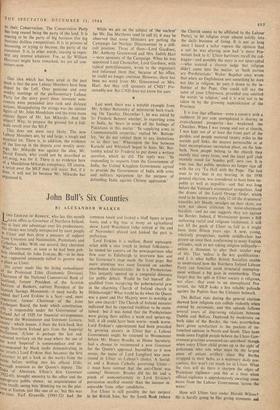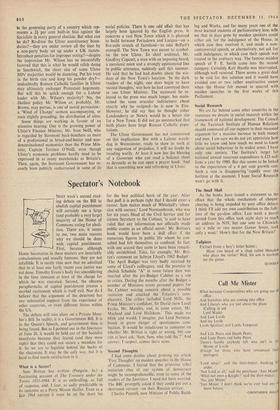John Bull's Six Counties
By ALEXANDER WALKER ORE) ERSKINE OF REMICK, who has this month taken office as Governor of Northern Ireland, has at least one advantage over his predecessors. His choice was totally unexpected by most people in Ulster and thus drew a measure of support from Unionists and Nationalists, Protestants and Catholics, alike. With one accord, they chorused 'Who?' Moreover, as soon as he had been pub- licly identified, Sir John Erskine, Bt.—as he then Was—appeared eminently suited to govern such a Place as Ulster.
His career reads like the living embodiment of the Protestant Ethic (Economic Division). Chairman of the National Commercial Bank of Scotland, former President of the Scottish Institute of Bankers, current President of the Scottish Savings Movement—it need hardly be added that' Lord Erskine is a Scot--and, most LnIPortant, former Chairman of the Joint xchequer Board, the body which constitution- 11Y 'is responsible under the Government of Ireland Act of 1920 for financial arrangements between the Westminster and Stormont Govern- rrlents'--which means, it fixes the kick-back that ,needy Northern Ireland gets from the Imperial Parliament. (Ulster is perhaps the last red- coloured territory on the map where the use of the word 'Imperial' is commonplace and un- 4,ceompanied by black mobs demonstrating in Inc streets.) Lord Erskine thus becomes the first 9overnor to get a look at the works from the Inside before settling into his official Hills- cisorough mansion as the Queen's deputy. The ur like of Abercorn, Ulster's first Governor l922-45), brought ancestry to the office and the 1Ppropriate public stance: an acquaintance of ne recalls seeing him 'drinking tea on the plat- ir'rni at Euston, just like one of us,' but this was kar-time. Earl Granville (1945-52) had the
common touch and looked a bluff figure in gum boots and a big mac at many an agricultural show. Lord Wakehurst (who retired at the end of November) played and looked the part to perfection.
Lord Erskine is a mellow, fluent septuagen- arian with a nice touch in instant folksiness— he turned his camera on the newspapermen who flew over to Edinburgh to interview him and the Governor's snap made the front page. But more attention was soon focused on another unorthodox characteristic: he is a Presbyterian. This instantly opened up a congenial dilemma for public debate. Would he feel himself dis- qualified from occupying the gubernatorial pew in the charming Church of Ireland church in Hillsborough? What would he do when the Queen was a guest and Her Majesty went to worship at her own church? The Church of Ireland minister indicated that he expected tradition to be main- tained: but it was noted that the Presbyterians were giving their edifice a wash and spruce-up. Still, it all could have been worse--much worse. Lord Erskine's appointment had been preceded by growing anxiety in Ulster that a Labour Government might be returned to Westminster before Mr. Henry Brooke, as Home Secretary, had a chance to recommend a new Governor for the Queen's approval. Incredible as it now seems, the name of Lord Longford was men- tioned in Ulster as Labour's choice. A Social- ist and a Roman Catholic governing Ulster— it must have seemed that the anti-Christ was coming! However, Brooke did his bit and a pinch of noncomformity in Lord Erskine's persuasion smelled sweeter than the incense in- separable from other candidates. For Ulster is still possibly the last outpost in the British Isles, bar the South Bank (where
the Church seems to be affiliated to the Labour Party), to let religion erupt almost solidly into the daily business of living. It is not so long since I heard a tailor express the opinion that a suit he was altering now had 'a more Pro- testant look to it.' Ulster barristers recall the col- league—and possibly the story is not apocryphal —who assured a divorce judge that religion didn't come into the matter, as 'both parties are Presbyterians.' Walter Bagehot once wrote that when an Englishman sees something he does not like in religion, he puts it down to the in- fluence of the Pope. One could still say the same of your Ulsterman, provided you omitted the words 'in religion,' and it is wise not to be taken in by the growing sophistication of the Province.
It is true that affluence—even a country with a stubborn 10 per cent unemployed is sharing in cross-channel prosperity—has weakened the Churches. When I was young and not at church, I was kept out of at least the front part of the garden, and people motored twenty miles to the seaside golf links, the nearest permissible or at least inconspicuous recreation place, on the Sab- bath. Now people belong to the church they mainly stay away from, and the local golf club recently voted for Sunday golf, nem con. It is true, too, that public speakers no longer sign off with the cry 'To Hell with the Pope.' The last man to try that in my hearing, in the 1950 general election, was considered to have been im- polite as well as impolitic—and that was .long before the Vatican's ecumenical sympathies. And the drums of the Loyal Orange Order, which used to be beaten every July 12 till the drummers' knuckles left bloody smudges on their skins, are now not above criticism by noise-abatement loyalists—and no one suggests they are against the Border. Indeed, if Westminster passes a Bill outlawing racial and religious incitement, it will not fill the gaols of Ulster as full as it might have done fifteen years ago. A new, young, relatively prosperous, mobile middle-class has grown up since then, conforming to many English attitudes, such as not taking religion militantly— unless it threatens to alter their secular way of life. That 'unless' is the key qualification: and it is what baffles British Socialists unable to understand how the Northern Ireland Labour Party can function amid structural unemploy- ment without a big gain in membership. They forget that the split in Ulster society is religious, not class: that even to an unemployed Pro- testant, the NILP looks a less reliable palisade against the Papists than the Unionist bulwark.
The Belfast riots during the general election showed how religions can collide violently when steered by extremists, and this episode follows several years of improving relations between Dublin and Belfast. Deplored by moderates on both sides of the Border, the riots nevertheless have given satisfaction to the pockets of en- trenched opinion in North and South. They have made some English people believe the Ulster Gov- ernment practises armoured-car apartheid: though when every Ulster child grows up in the sight of policemen who tote what must be the largest piece of extant artillery since Big Bertha strapped to their belts, as a necessary daily pre- caution, this won't cut much ice in Ulster. What the riots will do there is sharpen the edges of Protestant vigilance--and this at a time when official vigilance is apprehensively awaiting some move from the Labour Government 'across the water.'
How will Ulster fare under Harold Wilson? . He is hardly going to like giving economic aid to the governing party of a country which rep- resents a 2+ per cent built-in bias against the Socialists in every general election. But what can he do? Re-draw the Ulster constituency boun- daries?—they are under review all the time by a non-party body set up under a UK statute. Introduce penalties for improper voting?—despite the impression Mr. Wilson has so successfully fostered that this is what he -would relish doing in Smethwick, the sheer size of some Ulster MPs' majorities would be daunting. Put his trust in the birth rate and keep his powder dry?— undoubtedly Roman Catholic families in Ulster may ultimately endanger Protestant hegemony. But will this be quick enough for a Labour leader with Mr. Wilson's majority? No, the likeliest policy MT. Wilson or, probably, Mr. Brown, may pursue, is one of moral persuasion: a `Wind of Change' sermon accompanying, or even slightly preceding, the distribution of alms.
Some things are working in favour of an attentive hearing. One is the growing power of Ulster's Finance Minister, Mr. Ivan Neill, who is regarded by Stormont back-benchers as more of a professional in bread-and-butter and non- denominational economics than the Prime Min- ister, Captain Terence O'Neill, even though Ulster's economic problems hardly need to be expressed in as many matchsticks as Britain's. Then, again, the Stormont Government has re- cently been publicly embarrassed in some of its social policies. There is one odd affair that has largely been ignored by the English press. It concerns a vast New Town which it is planned to build between Portadown and Lurgan—on a five-mile stretch of farmland—to take Belfast's overspill. The New Town was meant to symbol- ise the new Ulster. Its chief architect, Mr. Geoffrey Copcutt, a man with an imposing beard, a messianic mien and a strongly opinionated line in public utterance, suddenly quit this summer. He said that he had had doubts about the wis- dom of the New Town's location. 'In the dark reaches of the night, one does begin to have second thoughts,' was how he had conveyed them to one Ulster Minister. The statement he re- leased to the press was much longer, but main- tained the same oracular indirectness about exactly why he resigned—be is now in Eire. However, he did say that he thought either Londonderry or Newry would be a better site for a New Town. It did not go unremarked that both places have large Roman Catholic popu- lations.
The Ulster Government has not commented on this implication. But with a Labour watch- dog in Westminster, ready to show its teeth at any suggestion of prejudice, it will no doubt be treading warily. At least it now has the blessing of a Governor who can read a balance sheet as devoutly as he can open a prayer book. And that is something new and refreshing in Ulster.





























 Previous page
Previous page